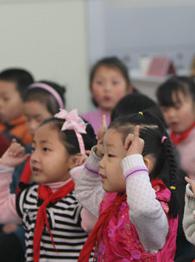
About the Project
This project is one of the 2014 WISE Awards finalists.
The New Education Experiment (NEE) project is a nationwide experiment in private education launched by Professor Zhu Yongxin in 2000. Its mission is to help teachers and children enjoy an integrated experience of learning and living in the schools. NEE promotes 10 projects in its 1,800 experimental primary and secondary schools to develop a reading-focus school, help teachers and students write essay, cultivate eloquence, listen to the voices outside campus, construct a digital community for teachers and students, and set up an ideal classroom.
Context and Issue
Solution and Impact
The project’s innovative solution is based on the idea that paying more attention to the daily experience of students and teachers will provide greater benefit to the students in the long term. New Education Experiment believes if the present experience and the well-being of children in their daily school life is ignored, the school education will become an accessory to the examinations. The project therefore promotes a theory of change that puts a focus on the enjoyable experience of learning and living of children in their schools. NEE Teachers changed their teaching methodology according to the project’s theory of change.
Since its launch in 2001 there are 42 local educational bureaus; more than 1,800 schools have voluntarily participated in NEE, and have implemented the experiments at their own expense. Some of the schools have even remained in the loop for over 10 years. NEE has become a significant influence on educational reform in China. There are more than five local education bureaus and more schools that are waiting for approval to join NEE.
Future Developments
The goal of NEE in the next five years is to continue the bottom-up change of education in China and scale up to 200 local education bureaus (which accounts for about 10 percent of China’s county district local government) covering 10 million teachers and students. Meanwhile it continues to improve the quality of schools participating in NEE comprehensively and increase educational equality in China.
To reach the five-year goal the project will set up 20 regional development centers to increase the interaction between schools and regions. It will also enhance both the online and offline network of teachers and establish an online teacher-training platform which includes 2,000 volunteer trainers. Moreover, it will create a batch of model “NEE Schools” around the country and also develop at least 20 mature curriculums to be used in the NEE schools. Lastly, it will work with third parties to develop more assessment research to strengthen the professional quality of NEE.


